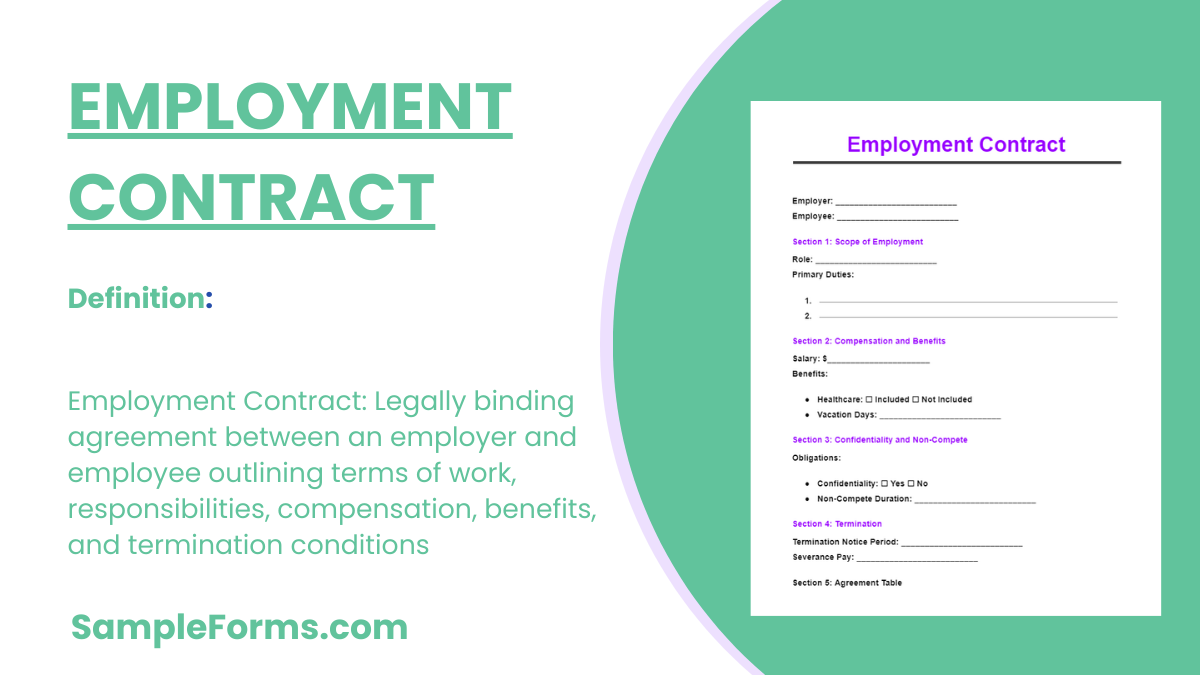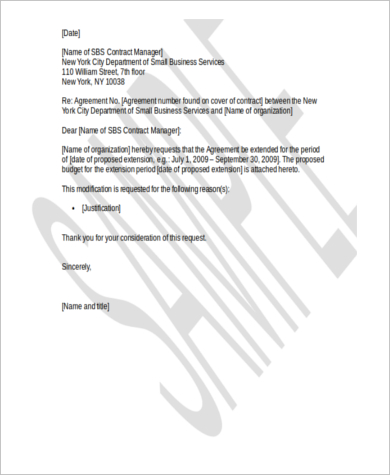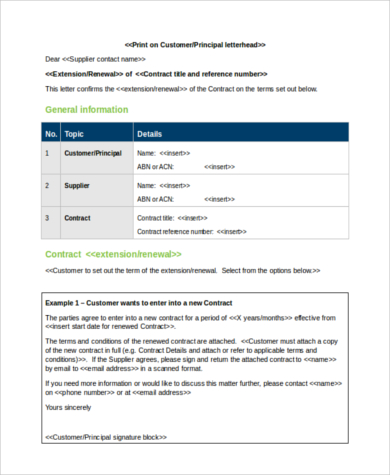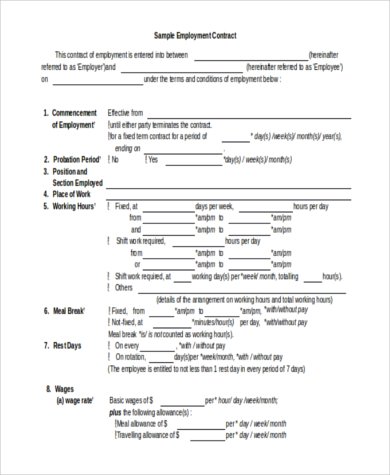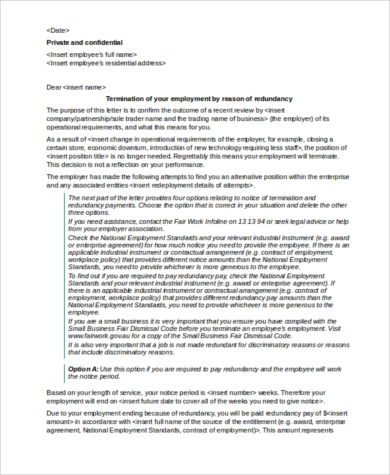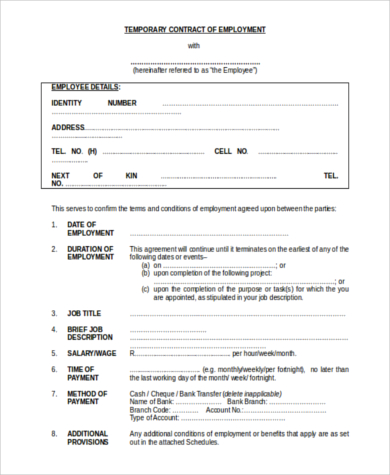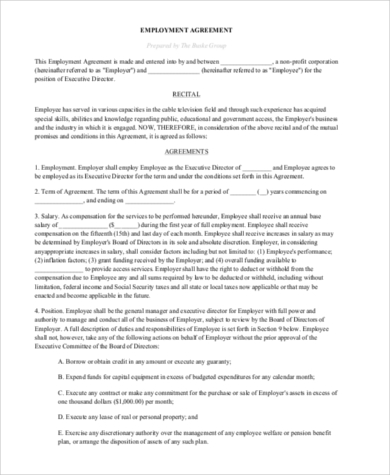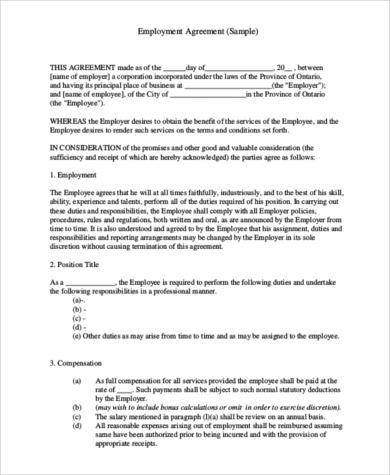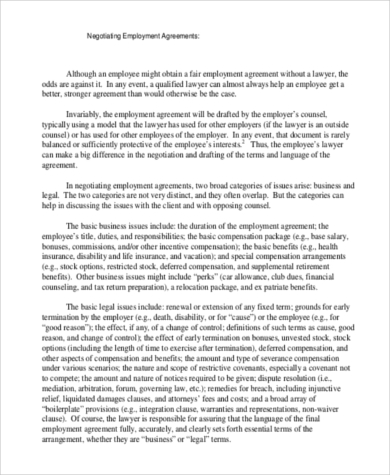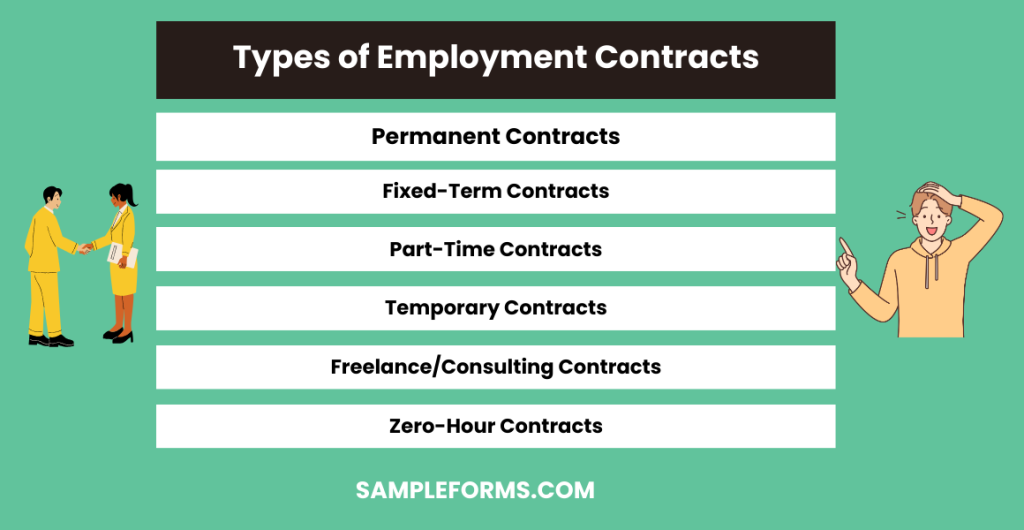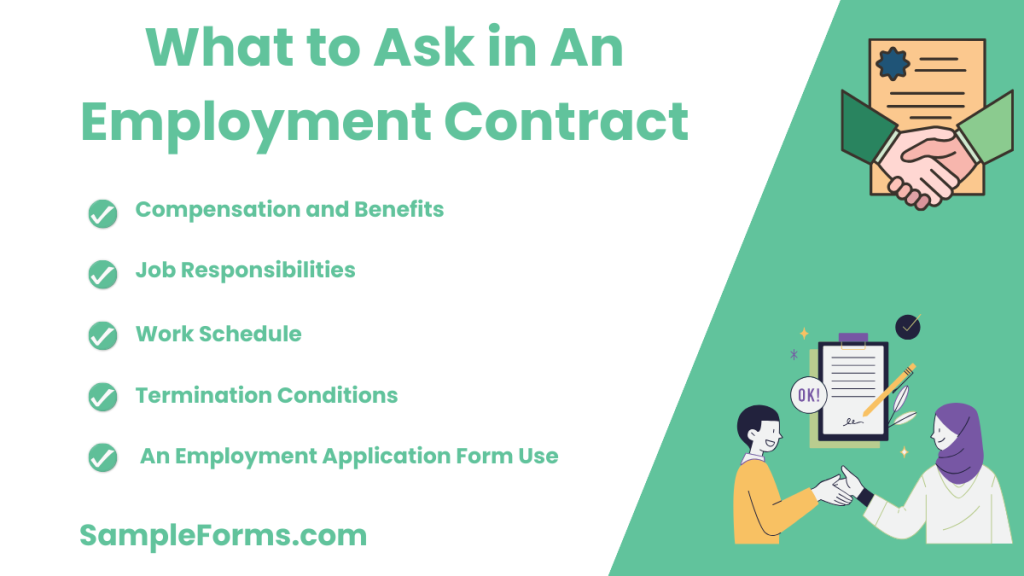An Employment Contract is a foundational tool that outlines the mutual responsibilities between an employer and an employee. This detailed guide provides you with essential insights and practical examples, helping you to navigate the complexities of creating effective employment agreements. Discover the nuances of drafting Employment Form and Contract Form that cater specifically to your business needs, ensuring clarity and mutual understanding in your employment relationships. Perfect for HR professionals and business owners alike, this guide includes examples that illustrate key points, making it an indispensable resource for anyone involved in the employment process.
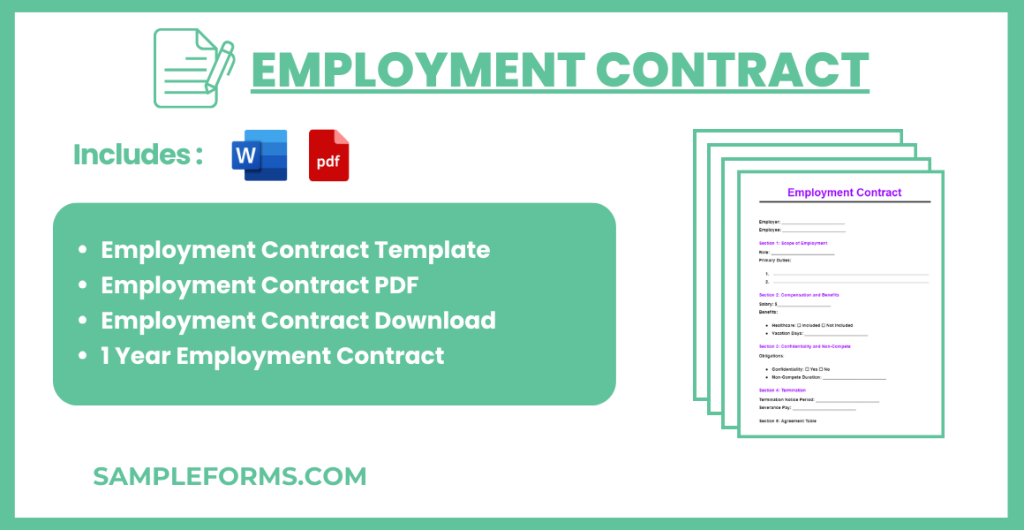
Download Employment Contract Bundle
What is an Employment Contract?
An Employment Contract is a formal agreement that specifies the terms and conditions of the relationship between an employer and an employee. This contract outlines the duties, responsibilities, rights, and expectations of both parties, establishing a clear framework for the working relationship. Typically, it includes details about job role, compensation, benefits, work hours, grounds for termination, and confidentiality requirements. The purpose of an employment contract is to ensure both parties have a clear understanding of the employment terms and to protect their respective rights under the law.
Employment Contract Format
1. Employee Information
- Full Name
- Address
- Contact Information
- Position Title
2. Employment Terms
- Start Date
- Duration (if applicable)
- Probation Period
- Work Hours
3. Compensation and Benefits
- Salary
- Bonuses or Incentives
- Health Insurance
- Vacation and Leave
4. Duties and Responsibilities
- Job Description
- Reporting Structure
5. Confidentiality Agreement
- Non-disclosure Provisions
6. Termination Conditions
- Notice Period
- Termination Reasons
7. Signature
- Employee Signature
- Employer Signature
- Date
Employment Contract Template
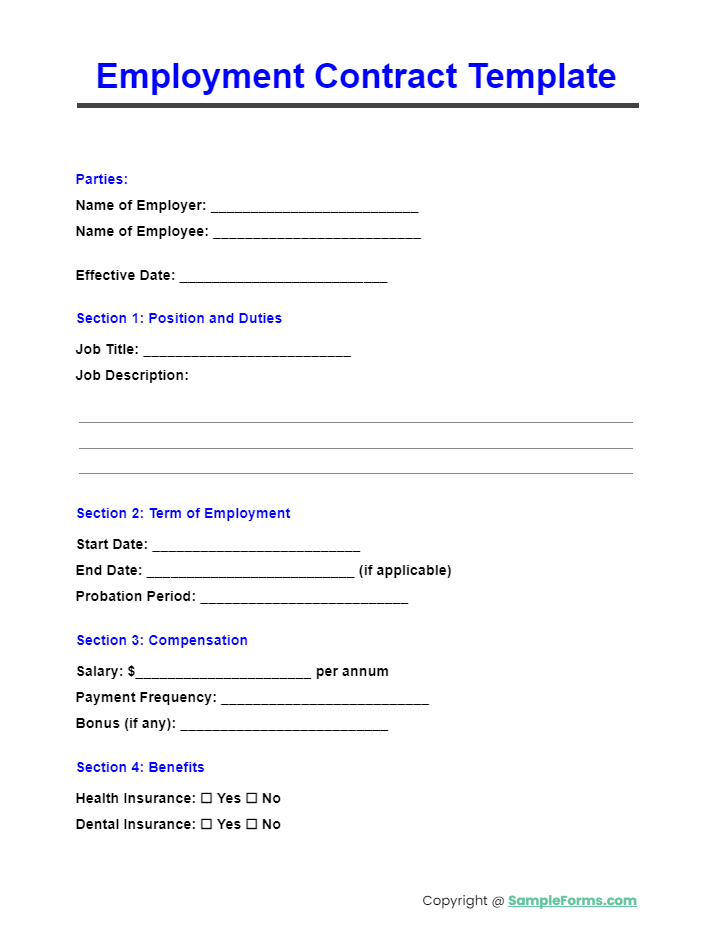
Streamline your hiring with our customizable Employment Contract Template, designed to incorporate essential elements like the Employment Declaration Form for full legal compliance. You may also see Employment Reference Form
Employment Contract PDF
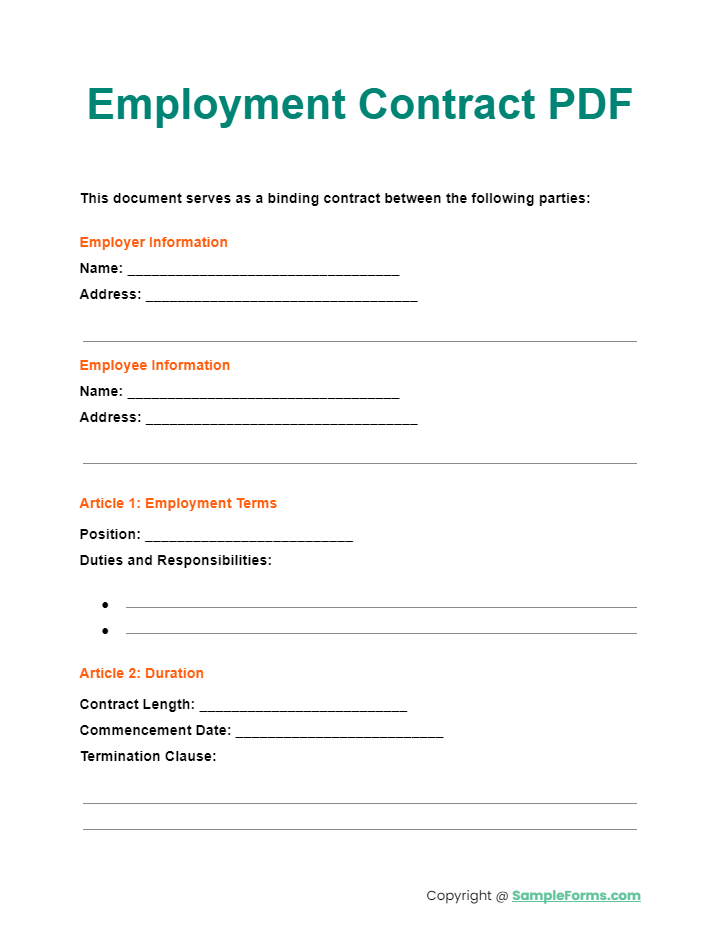
Access our ready-to-use Employment Contract PDF that includes detailed clauses and guidelines, ensuring your agreement meets Employment Certification Form standards. You may also see Employment Status Form
Employment Contract Download
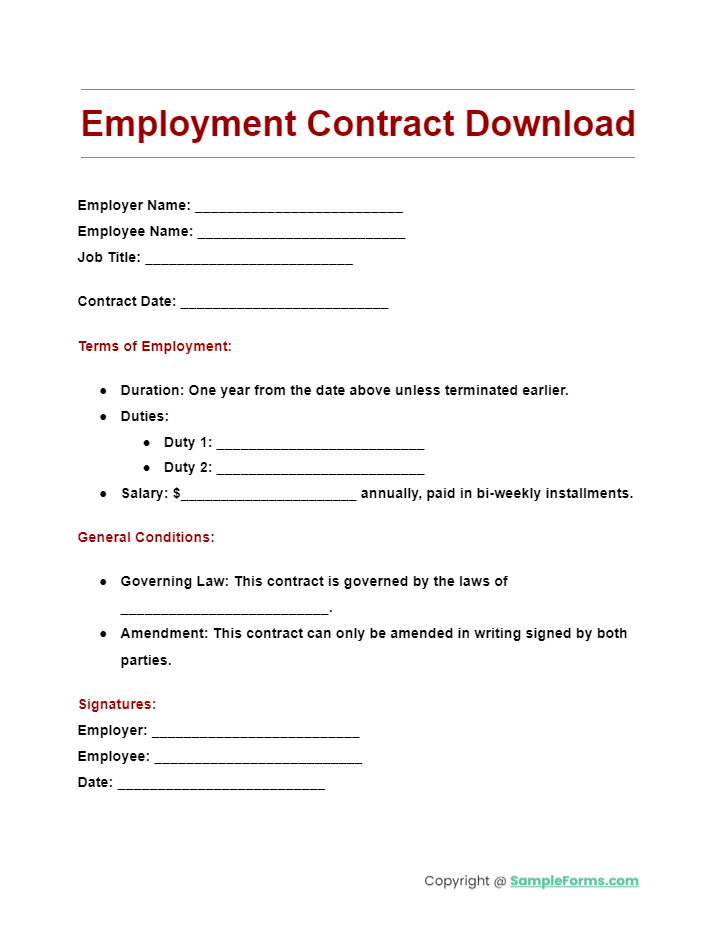
Download our versatile Employment Contract that simplifies the process of formalizing employment terms, including the critical Employment Eligibility Form for new hires. You may also see Employment History Form
1 Year Employment Contract
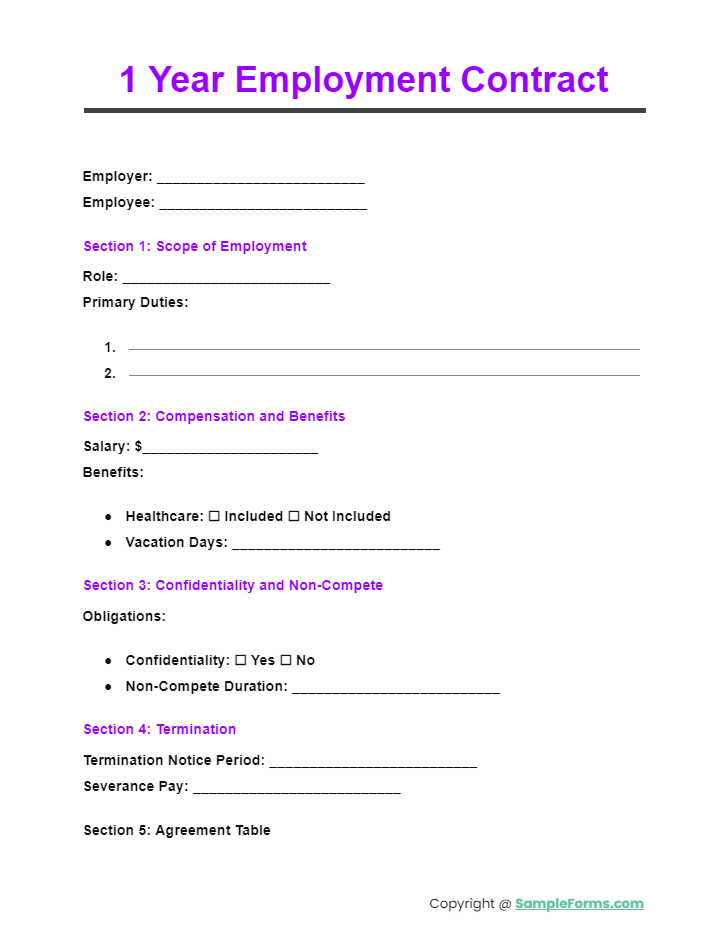
More Employment Contract Samples
Employment Contract Extension Letter Sample
Employment Contract Renewal Letter Example
Employment Contract Letter Sample
Employment Contract Termination Letter
Sample Temporary Contract Employment Form
Executive Employment Contract Form
Employment Contract Form in PDF
Employment Contract Negotiation
What to Look for in an Employment Contract?
- Detailed Job Description: Verify that the job title and role responsibilities are as discussed.
- Compensation Details: Look for specifics on pay structure, including overtime pay and raises.
- Duration of Contract: Note whether it’s an at-will employment or for a specified term.
- Reference to Form: Make sure any health and fitness requirements are fair and legal using Pre-Employment Physical Form
- Confidentiality Agreements: Be aware of any clauses that protect the company’s confidential information. You may also see Performance Contract Form
What Do Employment Contracts Do?
- Define Relationships: Establish clear roles and responsibilities of the employer and employee.
- Protect Rights: Safeguard the rights and duties of all parties involved.
- Outline Terms: Detail the terms of employment, including duration, salary, and job duties.
- Mention of Form: For contractors, ensure the contract specifies this status to avoid misclassification using Self-Employment Form
- Legal Framework: Provide a legal framework to resolve any disputes between the parties. You may also see Financial Contract Form
What Are Types of Employment Contracts?
- Permanent Contracts: Offer long-term employment with indefinite duration, providing stability and benefits.
- Fixed-Term Contracts: Specify employment for a set period, often for project-based work or temporary staffing needs.
- Part-Time Contracts: Offer employment for fewer hours than full-time positions, providing flexibility for both employers and employees. You may also see Contractor Contract Form
- Temporary Contracts: Provide short-term employment for specific tasks or seasonal work.
- Freelance/Consulting Contracts: Engage individuals on a project basis, with flexibility in hours and often working remotely.
- Zero-Hour Contracts: Offer no guaranteed hours of work, providing flexibility for employers but often lacking job security for employees. You may also see Farm Contract Form
What is Included in an Employment Contract?
- Parties’ Information: Names and details of the employer and employee.
- Terms of Employment: Start date, role, duties, and duration of the contract.
- Compensation: Salary, bonuses, and other benefits.
- Leave Entitlements: Information on sick leaves, vacation, and public holidays. Clause for Teacher Employment Form Specific terms relevant for educational positions. You may also see Employment Agreement Form
What is a Non-Compete Clause in an Employment Contract?
- Purpose: Understand why the clause is included, typically to protect the employer’s interests.
- Scope: Check the geographical and time scope to ensure they are reasonable.
- Exceptions: Look for any exceptions that allow you to work in certain situations.
- Enforceability: Confirm that the clause complies with local laws and is enforceable. Impact on Tenant Employment Verification Consider how this clause affects future job opportunities in your field. You may also see Employment Requisition Form
What Are the Requirements for a Legally Binding Contract?
- Offer and Acceptance: One party must make an offer that the other party accepts.
- Consideration: Each party must exchange something of value (e.g., services for salary).
- Mutual Consent: Both parties agree to the contract terms freely and with a clear understanding.
- Legal Purpose: The contract must be for a lawful purpose. Ensure the contract addresses termination processes and use of an Employment Separation Form. You may also see Legal Services Contract Form
What to Ask for in an Employment Contract?
- Compensation and Benefits: Ensure the contract clearly states your salary, bonus potential, and benefits including health insurance, retirement plans, and paid leave.
- Job Responsibilities: Confirm that the job duties and expectations are clearly defined.
- Work Schedule: Clarify your work hours, remote work possibilities, and flexibility.
- Use of an Employment Application Form: Check if the employment terms reflect the details provided in your Employment Application Form.
- Termination Conditions: Understand the conditions under which both parties can terminate the contract. You may also see Installment Contract Form
What is a Probationary Period in an Employment Contract?
A probationary period in an Employment Contract allows both employer and employee to assess compatibility before finalizing employment, typically used alongside an Employment Renewal Form.
Who Writes an Employment Contract?
Employment contracts are generally drafted by employers or HR professionals, often refined with legal counsel to ensure compliance and completeness, including necessary elements like an Application for Employment Form.
What Makes an Employment Contract Legally Binding?
An Employment Contract becomes legally binding when it has clear terms, mutual consent, offers, acceptance, and consideration, as outlined in an Employment Agreement.
Are Employment Contracts a Good Idea?
Employment contracts are beneficial as they clarify job roles, duties, and expectations for both parties, securing terms with tools like an Employment Eligibility Verification Form.
How Can a Contract be Legally Terminated?
A contract can be legally terminated upon mutual agreement, breach of contract, or if either party exercises termination rights specified in the contract, often requiring a Dual Employment Request Form for process adjustments.
What is a Confidentiality Clause in an Employment Contract?
A confidentiality clause in an Employment Contract obligates employees to keep proprietary information private, crucial in sectors like restaurant businesses using a Restaurant Employment Form.
How Long Are Most Employment Contracts?
Most employment contracts are fixed-term or at-will; fixed terms can range from one year to several years, depending on job nature and company policy, such as seen with Pre Employment Physical Form.
This guide serves as your comprehensive resource for understanding and creating an effective Employment Contract. It covers a variety of samples, forms, and letter templates that cater to diverse hiring needs. Ensure seamless employment processes and legal compliance by utilizing tailored Hunting Contract Form. This essential toolkit facilitates the drafting of robust employment agreements, fostering clear communication and understanding between employers and employees.
Related Posts
-
FREE 7+ Non-Disclosure Agreement Contract Forms in PDF | MS Word
-
FREE 5+ Mutual Release Agreement Contract Forms in PDF | MS Word
-
FREE 5+ Merger Agreement Contract Forms in PDF | MS Word
-
FREE 3+ Limited Partnership Agreement Contract Forms in PDF | MS Word
-
FREE 4+ Medical Release Agreement Contract Forms in PDF
-
FREE 5+ Office Lease Agreement Contract Forms in PDF
-
FREE 6+ Pledge Agreement Contract Forms in PDF | MS Word
-
FREE 5+ Medicaid Agreement Contract Forms in PDF
-
FREE 8+ Non-Competition Agreement Contract Forms in PDF | MS Word
-
FREE 4+ Limited Liability Agreement Contract Forms in PDF | MS Word
-
FREE 5+ Joint Venture Contract Forms in PDF | MS Word
-
Indemnity Agreement Form
-
FREE 3+ Sale of Goods Agreement Contract Forms in PDF | MS Word
